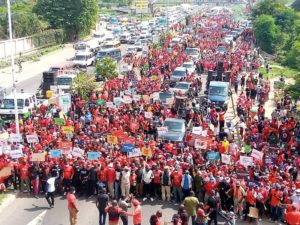The government of Ghana must prioritize fighting corruption in order to block the wastage in the system, President of the Pentecostal and Charismatic Prof. Paul Frimpong-Manso, has said.
He said Ghana loses huge monies through corruption, hence the menace must be nipped in the bud in order to generate revenue for national development.
Rev Frimpong Manso noted that each year, the Auditor General releases reports of wanton dissipation of resources and public funds.
The culprits, he said, should be held liable and be punished.
“E-levy or not, it is the corruption because what E-levy is going to bring will be less than what goes down the drain in from the public accounts, report, the Auditor General’s report and we see these people walking chest out. so whether we bring this or not that is
“Unless we tackle corruption and punish wrong deeds, E-levy or no e-levy we will stand at the same place.”
The Finance Minister had announced in the budget statement a new levy to be charged by government in 2022 on all electronic transactions to widen the tax net and rope in the informal sector.
“It is becoming clear there exists enormous potential to increase tax revenues by bringing into the tax bracket, transactions that could be best defined as being undertaken in the ‘informal economy’,” Mr Ofori-Atta observed on Wednesday, November 17 as he presented the 2022 budget statement in Parliament.
“After considerable deliberations, government has decided to place a levy on all electronic transactions to widen the tax net and rope in the informal sector. This shall be known as the ‘Electronic Transaction Levy or E-Levy’.”
He explained that the new E-levy will be a 1.75 per cent charge on all electronic transactions covering mobile money payments, bank transfers, merchant payments and inward remittances to be borne by the sender except inward remittances, which will be borne by the recipient.
This will, however, not affect transactions that add up to GH¢100 pr less per day.
“A portion of the proceeds from the E-Levy will be used to support entrepreneurship, youth employment, cyber security, digital and road infrastructure among others.”
This new levy is scheduled to start Saturday, January 1, 2022.
In 2020, total value of transactions was estimated to be over GH¢500 million with mobile money subscribers and users growing by 16 percent in 2019.
According to a Bank of Ghana report, Ghana saw an increase of over 120 percent in the value of digital transactions between February 2020 and February 2021 compared to 44 percent for the period February 2019 to February 2020 due to the convenience they offer.
This was definitely heightened by the advent of Covid-19 especially during the lockdown.
But the proposal has met resistance from the Minority in Parliament.
Minority Leader, Haruna Iddrisu said the E-levy is a disincentive to the growth of digital economy. To that end, he said, the Minority will not support it.
Speaking at a post budget workshop in Ho on Saturday November 20, he said “Mr Speaker, understandably, we see that the Minister of Finance seeks to introduce some measures including the now popularly declared e-levy or digital levy as some have quite named it.
“Mr Speaker, our concern is whether the e-levy itself is not and will not be a disincentive to the growth of digital economy in our country . We are convinced that the e-levy may as well even be a disincentive to investment and a disincentive to private sector development in our country. We in the minority may not and will not support government with the introduction of that particular e-levy . We are unable to build national consensus on that particular matter.”






